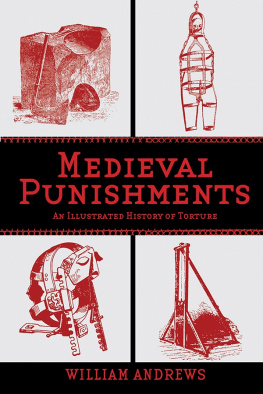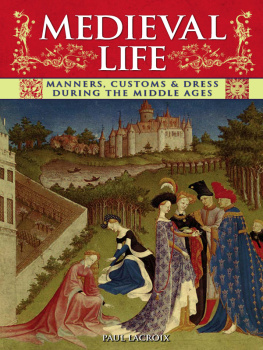William Andrews - Medieval Punishments : an Illustrated History of Torture
Here you can read online William Andrews - Medieval Punishments : an Illustrated History of Torture full text of the book (entire story) in english for free. Download pdf and epub, get meaning, cover and reviews about this ebook. City: New York, year: 2013,1898, publisher: Skyhorse Publishing, Inc., genre: History. Description of the work, (preface) as well as reviews are available. Best literature library LitArk.com created for fans of good reading and offers a wide selection of genres:
Romance novel
Science fiction
Adventure
Detective
Science
History
Home and family
Prose
Art
Politics
Computer
Non-fiction
Religion
Business
Children
Humor
Choose a favorite category and find really read worthwhile books. Enjoy immersion in the world of imagination, feel the emotions of the characters or learn something new for yourself, make an fascinating discovery.
- Book:Medieval Punishments : an Illustrated History of Torture
- Author:
- Publisher:Skyhorse Publishing, Inc.
- Genre:
- Year:2013,1898
- City:New York
- Rating:4 / 5
- Favourites:Add to favourites
- Your mark:
- 80
- 1
- 2
- 3
- 4
- 5
Medieval Punishments : an Illustrated History of Torture: summary, description and annotation
We offer to read an annotation, description, summary or preface (depends on what the author of the book "Medieval Punishments : an Illustrated History of Torture" wrote himself). If you haven't found the necessary information about the book — write in the comments, we will try to find it.
Medieval Punishments : an Illustrated History of Torture — read online for free the complete book (whole text) full work
Below is the text of the book, divided by pages. System saving the place of the last page read, allows you to conveniently read the book "Medieval Punishments : an Illustrated History of Torture" online for free, without having to search again every time where you left off. Put a bookmark, and you can go to the page where you finished reading at any time.
Font size:
Interval:
Bookmark:
Copyright 2013 by Skyhorse Publishing
All Rights Reserved. No part of this book may be reproduced in any manner without the express written consent of the publisher, except in the case of brief excerpts in critical reviews or articles. All inquiries should be addressed to Skyhorse Publishing, 307 West 36th Street, 11th Floor, New York, NY 10018.
Skyhorse Publishing books may be purchased in bulk at special discounts for sales promotion, corporate gifts, fund-raising, or educational purposes. Special editions can also be created to specifications. For details, contact the Special Sales Department, Skyhorse Publishing, 307 West 36th Street, 11th Floor, New York, NY 10018 or info@skyhorsepublishing.com.
Skyhorse and Skyhorse Publishing are registered trademarks of Skyhorse Publishing, Inc., a Delaware corporation.
Visit our website at www.skyhorsepublishing.com.
10 9 8 7 6 5 4 3 2 1
Library of Congress Cataloging-in-Publication Data is available on file.
ISBN: 978-1-62087-618-3
Printed in the United States of America
A N I LLUSTRATED H ISTORY OF T ORTURE
B Y W ILLIAM A NDREWS

Skyhorse Publishing
A BOUT twenty-five years ago I commenced investigating the history of obsolete punishments, and the result of my studies first appeared in the newspapers and magazines. In 1881 was issued Punishments in the Olden Time, and in 1890 was published Old Time Punishments: both works were well received by the press and the public, quickly passing out of print, and are not now easily obtainable. I contributed in 1894 to the Rev. Canon Erskine Clarkes popular monthly, the Parish Magazine, a series of papers entitled Public Punishments of the Past. The foregoing has been made the foundation of the present volume; in nearly every instance I have re-written the articles, and provided additional chapters. This work is given to the public as my final production on this subject, and I trust it may receive a welcome similar to that accorded to my other books, and throw fresh light on some of the lesser known byways of history.
W ILLIAM A NDREWS .
T HE H ULL P RESS ,
August 11th 1898.


 HE usual mode of capital punishment in England for many centuries has been, and still is, hanging. Other means of execution have been exercised, but none have been so general as death at the hands of the hangman. In the Middle Ages every town, abbey, and nearly all the more important manorial lords had the right of hanging, and the gallows was to be seen almost everywhere.
HE usual mode of capital punishment in England for many centuries has been, and still is, hanging. Other means of execution have been exercised, but none have been so general as death at the hands of the hangman. In the Middle Ages every town, abbey, and nearly all the more important manorial lords had the right of hanging, and the gallows was to be seen almost everywhere.
Representatives of the church often possessed rights in respect to the gallows and its victims. William the Conqueror invested the Abbot of Battle Abbey with authority to save the life of any malefactor he might find about to be executed, and whose life he wished to spare. In the days of Edward I. the Abbot of Peterborough set up a gallows at Collingham, Nottinghamshire, and hanged thereon a thief. This proceeding came under the notice of the Bishop of Lincoln, who, with considerable warmth of temper, declared the Abbot had usurped his rights, since he held from the kings predecessors the liberty of the Wapentake of Collingham and the right of executing criminals. The Abbot declared that Henry III. had given him and his successors Infangthefe and Utfangthefe in all his hundreds and demesnes. After investigation it was decided that the Abbot was in the wrong, and he was directed to take down the gallows he had erected. One, and perhaps the chief reason of the prelate being so particular to retain his privileges was on account of its entitling him to the chattels of the condemned man.
Little regard was paid for human life in the reign of Edward I. In the year 1279, not fewer than two hundred and eighty Jews were hanged for clipping coin, a crime which has brought many to the gallows. The following historic story shows how slight an offence led to death in this monarchs time. In 1285, at the solicitation of Quivil, the Bishop of Exeter, Edward I. visited Exeter to enquire into the circumstances relating to the assassination of Walter Lichdale, a precentor of the cathedral, who had been killed one day when returning from matins. The murderer made his escape during the night and could not be found. The Mayor, Alfred Dunport, who had held the office on eight occasions, and the porter of the Southgate, were both tried and found guilty of a neglect of duty in omitting to fasten the town gate, by which means the murderer escaped from the hands of justice. Both men were condemned to death, and afterwards executed. The unfortunate mayor and porter had not anything to do with the death of the precentor, their only crime being that of not closing the city gate at night, a truly hard fate for neglect of duty.
A hanging reign was that of Henry VIII. It extended over thirty-seven years, and during that period it is recorded by Stow that 72,000 criminals were executed.
In bygone times were observed some curious ordinances for the conduct of the Court of Admiralty of the Humber. Enumerated are the various offences of a maritime character, and their punishment. In view of the character of the court, the punishment was generally to be inflicted at low watermark, so as to be within the proper jurisdiction of the Admiralty, the chief officer of which, the Admiral of the Humber, being from the year 1451, the Mayor of Hull. The court being met, and consisting of masters, merchants, and mariners, with all others that do enjoy the Kings stream with hook, net, or any engine, were addressed as follows: You masters of the quest, if you, or any of you, discover or disclose anything of the Kings secret counsel, or of the counsel of your fellows (for the present you are admitted to be the Kings Counsellors), you are to be, and shall be, had down to the low-water mark, where must be made three times, O Yes! for the King, and then and there this punishment, by the law prescribed, shall be executed upon them; that is, their hands and feet bound, their throats cut, their tongues pulled out, and their bodies thrown into the sea. The ordinances which they were bound to observe, include the following: You shall inquire, whether any man in port or creek have stolen any ropes, nets, cords, etc., amounting to the value of ninepence; if he have, he must be hanged for the said crimes, at low water-mark. If any person has removed the anchor of any ships, without licence of the master or mariners, or both, or if anyone cuts the cable of a ship at anchor, or removes or cuts away a buoy; for any of the said offences, he shall be hanged at low water-mark. All breakers open of chests, or pickers of locks, coffers, or chests, etc., on shipboard, if under the value of one and twenty pence, they shall suffer forty days imprisonment; but, if above, they must be hanged as aforesaid. If any loderman takes upon himself the rule of any ship, and she perishes through his carelessness and negligence, if he comes to land alive with two of his company, they two may chop off his head without any further suit with the King or his Admiralty. The sailor element of the population of the olden days was undeniably rude and refractory, the above rules showing that the authorities needed stern and swift measures to repress evildoers of that class.
Font size:
Interval:
Bookmark:
Similar books «Medieval Punishments : an Illustrated History of Torture»
Look at similar books to Medieval Punishments : an Illustrated History of Torture. We have selected literature similar in name and meaning in the hope of providing readers with more options to find new, interesting, not yet read works.
Discussion, reviews of the book Medieval Punishments : an Illustrated History of Torture and just readers' own opinions. Leave your comments, write what you think about the work, its meaning or the main characters. Specify what exactly you liked and what you didn't like, and why you think so.









